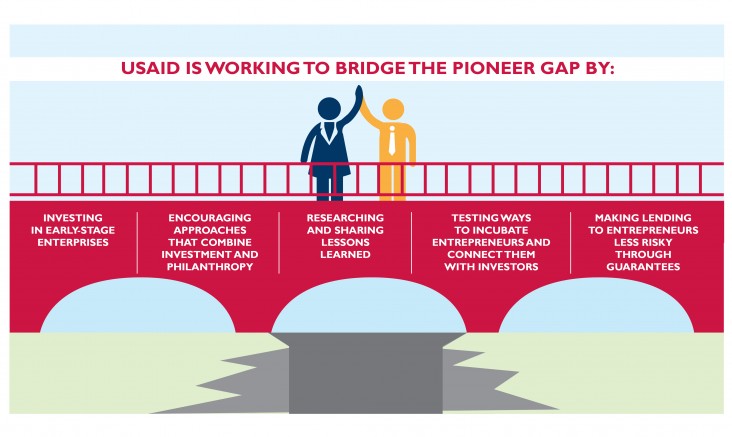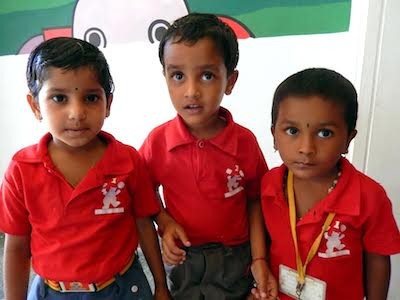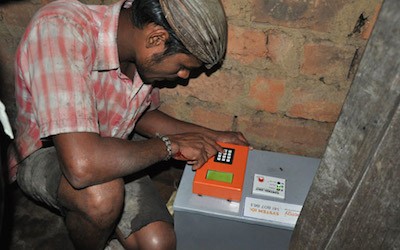- What We Do
- Agriculture and Food Security
- Democracy, Human Rights and Governance
- Economic Growth and Trade
- Education
- Ending Extreme Poverty
- Environment and Global Climate Change
- Gender Equality and Women's Empowerment
- Global Health
- Water and Sanitation
- Working in Crises and Conflict
- U.S. Global Development Lab

Entrepreneurs play a vital role in driving economic growth, creating jobs and innovating to improve people's’ lives through market-based solutions. Impact investors are looking for a pipeline of businesses to invest in that generate both financial and social returns.
Yet impact investors are often unable to connect with the early-stage entrepreneurs due to the "pioneer gap" that exists between high-risk, promising early-stage enterprises and impact investors looking for enterprises to invest in.
Partnering to Accelerate Entrepreneurship Initiative
The Partnering to Accelerate Entrepreneurship (PACE) Initiative aims to catalyze private-sector investment into early-stage enterprises and identify innovative models or approaches that help entrepreneurs bridge the pioneer gap – thus unlocking the potential of thousands of promising enterprises around the world.
Working in partnership with more than 40 incubators, accelerators, and seed-stage impact investors, USAID’s U.S. Global Development Lab creates public-private partnerships dedicated to testing ways to bridge this gap and foster entrepreneurship. These partnerships are expected to leverage $100 million in combined public and private investments over their lifetime.
PACE Initiative Partnerships
Since September 2014, the Lab has announced the following partnerships formed under the PACE initiative:
USAID and the Aspen Network of Development Entrepreneurs (ANDE) signed a three year partnership to bolster entrepreneurial ecosystems, which are essential to creating opportunities for small businesses to grow and drive greater prosperity in emerging markets. This joint project will be administered in partnership with the Ford Foundation and will support the strengthening of ANDE’s people and processes to drive greater impact. A portion of the program will focus on the expansion of the East and Southeast Asia (ESEA) and Latin American Chapters of ANDE.
The Global Impact Investing Network (GIIN) is a nonprofit organization dedicated to increasing the scale and effectiveness of impact investing. The GIIN is partnering with USAID on initiatives to help build the impact investing market in four key areas: i) enabling sound practices in impact measurement and management, ii) catalyzing product development, iii) creating high-impact research, and iv) strengthening the capacity of impact investors. These activities are expected to accelerate the growth of a robust and effective impact investing market and increase capital flow to innovative enterprises and initiatives that are addressing critical social and environmental challenges globally.
Village Capital finds, trains, and funds entrepreneurs through a unique peer-selected investment approach. With financial support from USAID, Village Capital was able to raise a $15 million fund that leverages the peer selection process to make small, early-stage investments in a cost-effective way. Click here for more information on the Village Capital partnership.
Unitus Seed Fund is a micro venture capital firm that applies the best practices of for-profit investing to early-stage social enterprises in India. With USAID support, Unitus Seed Fund is helping Indian accelerators improve their services to entrepreneurs and expanding their investments into ten new cities. Click here for more information on the Unitus partnership.

Shell Foundation supports entrepreneurs seeking to provide access to modern clean energy services for low-income communities in developing countries. USAID and Shell are jointly supporting early-stage clean energy technology start-ups through Factor(E), an incubator based in Colorado, and Sangam Ventures, an investment firm based in India. Click here for more information on the Shell Foundation partnership.
Catalyst for Growth aims to increase transparency in the business development services marketplace in South Africa by standardizing quality tracking systems of accelerators, incubators, and other service providers for early-stage entrepreneurs. Click here for more information on the Catalyst for Growth partnership.
Open Capital Advisors (OCA) is a management consulting and financial advisory firm based in Africa that helps businesses, investors, development partners, and the public sector identify opportunities and deliver unique, impactful solutions. USAID's first partnership with OCA (2014 - 2017) and five investors extended OCA's services to earlier-stage enterprises through a tiered support model. Click here for more information on the first OCA partnership. Building on learnings from the first partnership, the new partnership with OCA and seven investors aims to streamline the diligence process for early-stage investments and demonstrate a new model of post-investment support driven by local talent.
The IIX Foundation (formerly Shujog) is a technical assistance program implementing blended methods of providing business development services to entrepreneurs across Asia. USAID is supporting the IIX Foundation to create and deploy network of organizations to provide a full suite of investment support services for social enterprises in the Southeast Asian countries in which USAID works. Click here for more information on the IIX Foundation partnership.
Jibu is a social enterprise focused on delivering affordable water to underserved urban populations. By partnering with USAID, Jibu has been able to rapidly expand their franchises to new markets and close on two rounds of private growth capital. Click here for more information on the Jibu partnership.
Intellecap is accelerating social enterprises through corporate partnerships and angel networks in East Africa. With USAID support, Intellecap is expanding their proven model from India to East Africa, providing a broad set of acceleration and corporate partnership support services to entrepreneurs in the region. Click here for more information on the Intellecap partnership.
Enclude & Agora Partnerships, with Santa Clara University's Miller Center for Social Entrepreneurship and the Banco de America Central (BAC) Nicaragua, aims to expand access to finance for small and growing businesses, targeting those women-owned or -led, with a loan product that assesses risk and repayment of loans through variable payments and cash flow, rather than traditional assets. Click here for more information on the Variable Payment Obligation partnership.

Edge Growth, along with Association of Savings and Investment in South Africa (ASISA), aims to close a critical gap in the South African market by combining hands-on business development support with access to ASISA’s investment fund and integration of small and medium enterprises into corporate supply chains. Click here for more information on the ASISA/Edge Growth partnership.
Investisseurs & Partenaires (I&P) is partnering with USAID to support the creation of three new locally funded and locally managed seed-stage impact investing funds in Sénégal, Burkina Faso and Niger. Click here for more information on the I&P partnership.
MCE Social Capital is partnering with USAID to use an innovative loan guarantee model to expand their existing work in funding micro-finance institutions and to launch a fund dedicated to supporting small and growing businesses in Sub-Saharan Africa and beyond. Click here for more information on the MCE Social Capital partnership.
Root Capital is partnering with USAID to invest in the growth of early-stage agricultural small and growing businesses (SGBs) and improve their access to more formal and/or commercial markets. Through the partnership, USAID and Root Capital will examine the costs, impacts, and returns associated with lending to early-stage businesses, and build the case for increased investment in blended capital approaches to accelerating business growth and graduation to commercial markets. Click here for more information on the Root Capital partnership.
Yunus Social Business and USAID have partnered to to support to help increase the sustainability and impact of social enterprises. Click here for more information on the YSB partnership in Uganda.
Villgro Innovation Foundation is partnering with USAID to replicate their early-stage highly customized incubation model in Kenya and Vietnam.
- In Kenya, Villgro and USAID are working with the Lemelson Foundation to support Villgro-Kenya’s health-focused incubator. Click here for more information on the Villgro Kenya partnership.
- In Vietnam, Villgro and USAID are working with Lotus Impact to set up an incubation and investment program alongside new local angel investor networks, such as the Mekong Angel Investor Network.
Global Accelerator Learning Initiative: In order to ensure that PACE not only tests innovative acceleration models but also contributes significantly to the sector’s knowledge base, the Lab is partnering with the Omidyar Network, The Lemelson Foundation, the Argidius Foundation, the Aspen Network of Development Entrepreneurs (ANDE), and Emory University to launch the most comprehensive research project to-date on the efficacy of accelerator programs. As a result of this Global Accelerator Learning Initiative (GALI), accelerator programs will have statistical data and market insight to better inform their own decision-making as they train the entrepreneurs who create the goods and services that benefit all sectors of society. This data will also be made available to researchers and practitioners for their own analyses, providing greater understanding to all involved in the entrepreneurial ecosystem, from managers to policy makers. Click here for more information on the GALI partnership.
Accelerating Entrepreneurs: Insights from USAID's Support for Small and Growing Businesses
USAID is pleased to release the executive summary of Accelerating Entrepreneurs: Insights from USAID’s Support for Small and Growing Businesses, an analysis of our PACE program. The report aims aims to help better understand how working with intermediaries supports entrepreneurs around the world and to provide data that can inform the decisions of public funders, private investors and policymakers who are interested in working with intermediaries in entrepreneurial ecosystems.
Resources
- Partnering to Accelerate Entrepreneurship factsheet
- Learn more about USAID's approach to partnerships
- For more information on PACE, contact pace[at]usaid.gov.







Comment
Make a general inquiry or suggest an improvement.